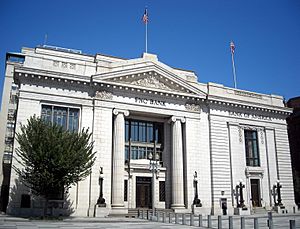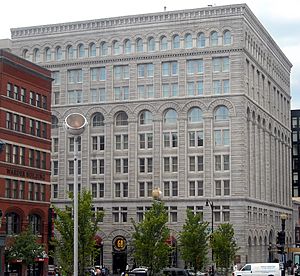Riggs Bank facts for kids
 |
|
| Industry | Banking |
|---|---|
| Fate | Acquired by PNC Financial Services |
| Founded | 1836 |
| Founder | William Wilson Corcoran |
| Defunct | May 13, 2005 |
| Headquarters | Washington, D.C. |
|
Key people
|
Anthony P. Terracciano, Chairman Steven T. Tamburo, CFO |
| Total assets | $6.008 billion (2004) |
| Total equity | $0.317 billion (2004) |
|
Number of employees
|
1,307 (2004) |

Riggs Bank was a very important bank in Washington, D.C.. For most of its history, it was the biggest bank in that city. The bank was famous for managing the money of many U.S. Presidents and foreign embassies.
Twenty-three U.S. Presidents or their families banked at Riggs. This included famous leaders like Abraham Lincoln and Dwight D. Eisenhower. Other important people who used Riggs Bank were American Red Cross founder Clara Barton and women's rights leader Susan B. Anthony.
Riggs Bank even called itself "the most important bank in the most important city in the world." However, the bank faced some serious problems with how it handled money. Because of these issues, another company called PNC Financial Services bought it on May 13, 2005.
Contents
The Start of Riggs Bank
In 1836, a man named William Wilson Corcoran started a small business that helped people buy and sell things. A few years later, in 1840, Corcoran teamed up with George Washington Riggs. They created a new company called "Corcoran & Riggs." This company offered services like checking accounts and places to deposit money.
Growing the Bank
In 1844, the U.S. government chose Corcoran & Riggs to be the only federal bank in Washington. This meant a lot more business for them! The bank grew quickly.
In 1845, Corcoran & Riggs helped pay for Samuel Morse's amazing invention, the telegraph. They also moved into a new main office right across from the U.S. Treasury building.
In 1847, the bank lent a huge amount of money, $16 million, to the U.S. government. This money helped pay for the Mexican–American War.
New Leadership and Big Deals
In 1854, William Corcoran retired from the bank. George Washington Riggs took over as the main leader. The bank's name changed to "Riggs & Company."
Riggs Bank continued to be involved in major historical events. In 1868, the bank provided $7.2 million in gold. This money was used to buy Alaska from Russia.
In the 1860s, the bank also helped fund Robert Peary's first trip to the North Pole. They also helped pay for the expansion of the United States Capitol building.
In 1881, George Washington Riggs passed away.
Becoming a National Bank
In 1891, a new Riggs Bank building opened in Washington. It was built in a special style called Richardsonian Romanesque.
In 1896, the bank became "Riggs National Bank" after getting a special government approval. Charles C. Glover became the new president. By 1898, the Riggs family was no longer directly involved in running the bank.
In 1909, the bank's president suggested an economic plan to the United States Congress. This plan later led to the creation of the Federal Reserve in 1913. The Federal Reserve helps manage the country's money system.
World Wars and the Great Depression
During World War I, Riggs Bank helped sell "Liberty bonds." These bonds helped the government pay for the war. In the 1920s, the bank created new ways for people to save money.
During the Great Depression, a very difficult economic time, a Riggs director named Robert V. Fleming advised President Franklin D. Roosevelt.
Expanding Across the City
Riggs Bank grew by buying other banks and opening new branches.
- In 1922, they bought Hamilton Savings Bank and opened a branch in Dupont Circle.
- They also built the Riggs-Tompkins Building, which was the largest building in Columbia Heights at the time.
- In 1925, they bought Northwest National Bank.
- In 1928, they acquired Farmers and Mechanics National Bank.
- In 1933, Riggs bought parts of Chevy Chase Savings Bank.
Banking for Embassies
Starting in the early 1900s, Riggs Bank worked hard to get embassies and diplomats as customers. By 1950, most foreign embassies in Washington were banking with Riggs.
In the 1950s, the bank opened an office at Walter Reed Hospital.
More growth happened in the 1950s:
- In 1954, Riggs bought Washington Loan and Trust.
- In 1958, they acquired Lincoln National Bank.
Later Years and Final Sale
In 1981, a businessman named Joe Allbritton gained control of the bank and became its chairman.
In 1986, Riggs Bank expanded into Northern Virginia by buying Guaranty Bank and Trust Company. In 1990, they acquired The Bank of Washington.
In 1993, Joe Allbritton stepped down as the bank's chief executive. This happened after the bank faced challenges during a financial crisis known as the savings and loan crisis.
Finally, on May 13, 2005, Riggs Bank was bought by PNC Financial Services. This happened after the bank had faced several investigations into how it handled money.
Images for kids
See also
 In Spanish: Riggs Bank para niños
In Spanish: Riggs Bank para niños
 | Victor J. Glover |
 | Yvonne Cagle |
 | Jeanette Epps |
 | Bernard A. Harris Jr. |


